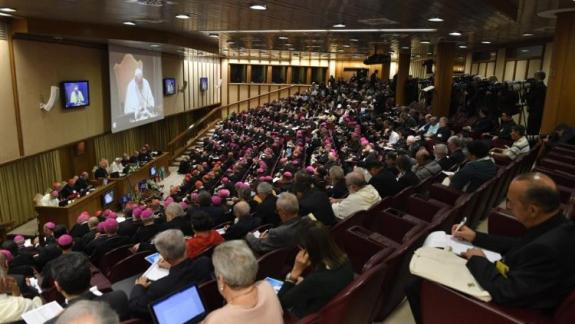Will the synod conclude with a proposal to ordain women to the diaconate?
From The New York Times:
The Tablet, a British Catholic news weekly, reported this week that a proposal to ordain women deacons was included in the final report that will be put to the vote on Saturday. The proposal will require a two-thirds majority of the participants to pass.
Catholic activists working for greater gender equality in the church say that the bishops who are meeting to formally define women’s roles in the church in the Amazon need look no further than the reality on the ground.
That was the view of Sister Nilma Do Carmo De Jesus, a Brazilian-born Comboni missionary who is in Rome for a series of eventshighlighting the challenges facing the region.
“In Brazil, most Catechists are women, the leaders of local communities are women, women animate the liturgical aspects of the Mass, through song and celebration, these women bring the ministry forward,” she said. “They are very important, but they are not visible because they don’t have institutional recognition…”
…The church hierarchy, including Pope Francis, has made it clear in recent decades that ordaining women as priests is not on the table.
But some church historians have argued that there is evidence that women served in the role of deacon, an ordained minister, in the early church. Scholars have noted that in some countries and dioceses, women were ordained as deacons and considered clergy until the 12th century.
The Second Vatican Council of the 1960s allowed married men, generally over the age of 35, to be ordained as deacons. The pope has suggested in the past that he is open to discussing the issue, setting up a commission to examine the history of female deacons in the church.
But he has also indicated that it is unlikely to happen. In May, he told religious sisters meeting in Rome that further study was required.
A change to the Code of Canon Law made by Pope Benedict XVI in 2009 provides a canonical path to allow the ordination of women deacons, a Brazilian bishop said.
Speaking to journalists at a synod press briefing Oct. 25, Bishop Evaristo Pascoal Spengler of Marajo said the revision was “an important step” in that it clarifies that those ordained to the diaconate fulfill a ministry of service rather than acting in the person of Christ.
The 2009 document, given “motu proprio,” on the pope’s own initiative, was titled “Omnium in Mentem” (“Everything in mind”) and revised several canons concerning the sacraments of holy orders and marriage.
In it, the now-retired pontiff added an article to canon 1009, stating that “those who are constituted in the order of the episcopate or the presbyterate receive the mission and capacity to act in the person of Christ the head, whereas deacons are empowered to serve the people of God in the ministries of the liturgy, the word and charity.”
“(Pope) Benedict XVI separated the diaconal ministry from Christ as head,” Bishop Spengler said. “Canonically, there is already a path for the ordination of a woman as a deacon, not as a priest or a bishop,” he added.
However, the bishop did not mention canon 1024, which states that “a baptized male alone receives sacred ordination validly.”
In a good many places around this country, deacons have nothing remotely resembling power. “Part of the management team”? Most deacons would tell you they are labor, not management. There are a lot of parishes where pastors don’t let deacons preach, baptize or witness marriages. (I can vouch for this: some of the people in the pews aren’t crazy about that, either. I had one bride who did not want me to do her wedding ceremony, after the original priest became unavailable, because she had to have a priest.)There are dioceses where a significant number of priests do not even think deacons are “really ordained.” (Check out this story, for example, which suggests diaconal ordination is really only temporary and could expire.) There are pastors who refuse to promote the vocation — and, in fact, do everything to discourage it.
And, of course, there are bishops (and some priests) who have stated they feel the vocation is unnecessary and just another aggravation.
I still get incredulous looks when I tell the story I heard when I was in formation, of a monsignor who learned that a deacon would be assisting at his Mass and laughed. “A deacon?,” he said. “Hell, if I wanted a potted plant I would have called FTD.”
And then there was the time I attended the Vigil Mass for the funeral of a priest. I was the only deacon, amid about a dozen priests. I was vested and asked the MC if there was anything I could do, anything at all. “No, I don’t think so,” he said. “We don’t need a deacon for the Mass and we have enough priests for communion.”
So I sat in the pews.
So when I hear people exclaim that being a deacon brings with it some sort of power or influence or importance, I have to laugh. No. Not really.
One answers the call to the diaconate not for power or influence, but out of a love for the Lord and a desire to serve.
I’ve said this before and I’ll say it again: whatever one may think about the theology of women clergy, the lived reality of this vocation is something altogether different.
If the Church is serious about considering women deacons, I’d encourage all concerned to get male deacons right first.
And frankly, in that regard, we still have a long way to go.
















